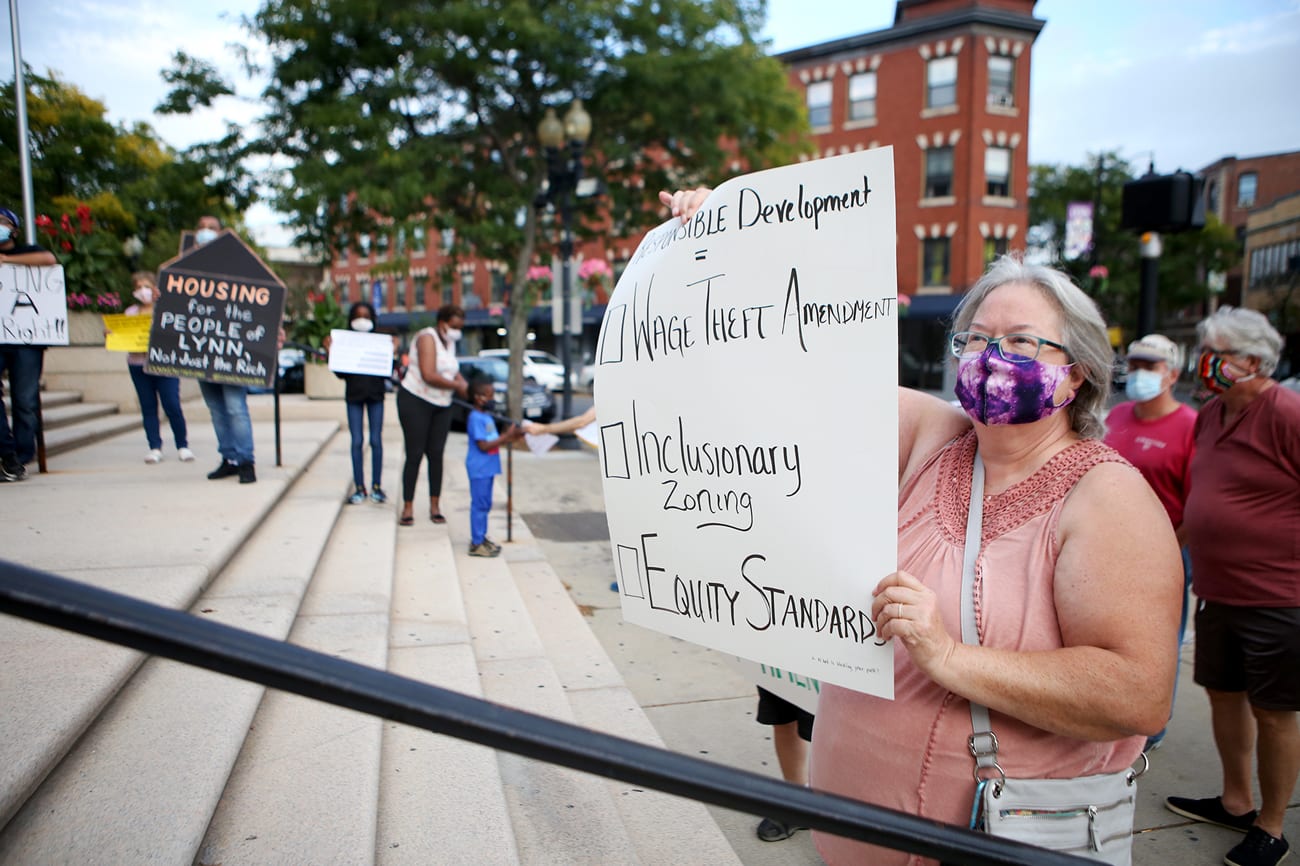LYNN — The City Council voted unanimously Tuesday evening to amend its Wage Theft Ordinance, closing a loophole that allowed developers to receive tax breaks without reporting information about its contractors’ previous wage theft or labor violations.
“This amendment holds employers and developers accountable,” said City Councilor-at-Large Brian LaPierre, who introduced the amendment to the Wage Theft Ordinance along with City Councilor Fred Hogan.
A crowd of more than 40 construction workers, teachers, National Grid employees and housing justice advocates gathered outside of Lynn City Hall to show support for councilors’ votes and to share their vision for the future of Lynn development.
“We demand that workers are paid for the work they do and are not threatened by their employers to take less than they deserve,” said Carpenters’ Union 339 representative Chris Galatis in a speech on the City Hall steps. “This is a working class city and it should work for its people.”
The Wage Theft Ordinance was put into place two years ago in order to ensure that workers on taxpayer-subsidized projects are justly compensated.
This loophole in the ordinance came to public attention when it came out that the taxpayer-subsidized Munroe Street development used subcontractors with a history of wage theft violations, OSHA violations and tax fraud.
One of those subcontractors, New Jersey-based P&B Partitions Inc., was cited last year and ordered to pay $158,139 in back wages and liquidated damages to 50 employees in order to resolve “willful violations” of the Fair Labor Standards Act, according to a 2019 report by the GoLocalWorcester News Team.
The order followed an investigation from the U.S. Department of Labor’s Wage and Hour Division, which stemmed from a complaint filed by the Worcester Carpenters Union, according to the online report.
In Lynn, two workers for the Munroe Street development filed separate wage-theft complaints with the city’s Law Department last June. Jose Anaya and Tyrone Woods, who both identified themselves as being employed to work as carpenters on the site for P&B Partitions and Family Drywall Corp., from Feb. 5 to April 9, 2020, said they had not received payment of wages for all of the time they had worked on the property and had not been paid overtime for all hours worked over the 40-hour work week.
In addition, both said they were paid directly in cash or personal check, and there were no withholdings from their payments, including federal and state taxes and unemployment insurance for the first three weeks of their employment, according to the complaints.
Since the two workers had already filed their complaints with the Attorney General’s office, neither complaint came before the city’s Wage Theft Advisory Committee, which was created with the initial wage theft ordinance that was passed by the City Council two years ago, according to Assistant City Solicitor James Lamanna.
According to the amendment, that advisory committee is tasked with investigating wage theft selected by the City Council from lists provided by various community groups, including the North Shore Labor Coalition, the Lynn Area Chamber of Commerce, the North Shore Latino Business Association, the North Shore Building Trades Council, the Lynn Worker Center, and the New Lynn Coalition.
The group meets twice a month to advise the City Council on the implementation of the Wage Theft Ordinance.
Wage theft is reportedly a significant problem in the Commonwealth, with the Massachusetts Attorney General’s Fair Labor Division requiring employers to pay $6.65 million in restitution to workers this past year. Data from the MA Coalition to Stop Wage Theft estimates that the actual amount of wages stolen from employees annually is nearly $700 million.
“This [amendment] is good for workers, taxpayers and small businesses that do play by the rules,” said Katie Cohen, the executive director of the North Shore Labor Council, the group that coordinated the action.
“It’s a good step forward, but we also want to make sure that any future development provides good paying jobs and a reasonable level of affordable housing.”
The rally featured signs displaying a checklist of goals for Lynn development — first to amend the Wage Theft Ordinance, then to achieve inclusionary zoning, and finally to establish equity standards.
Two letters from residents, including Cohen, that were in support of the amended ordinance were read by City Clerk Janet Rowe during the wage theft ordinance public hearing, but there was no discussion from the City Council before their vote Tuesday evening.
“We want responsible development,” said LaPierre at the rally outside City Hall. “That takes into account all of the city’s voices.”

